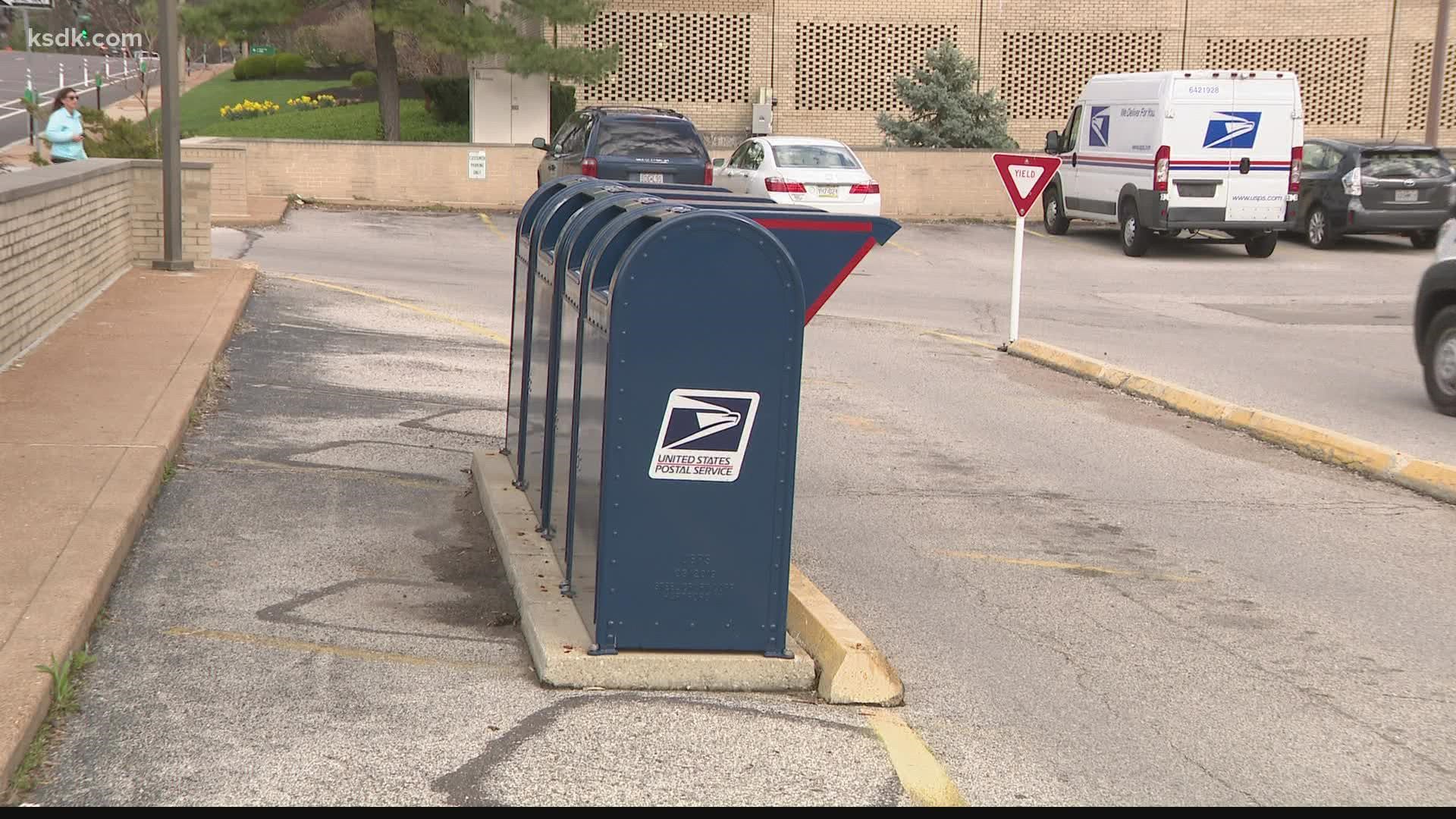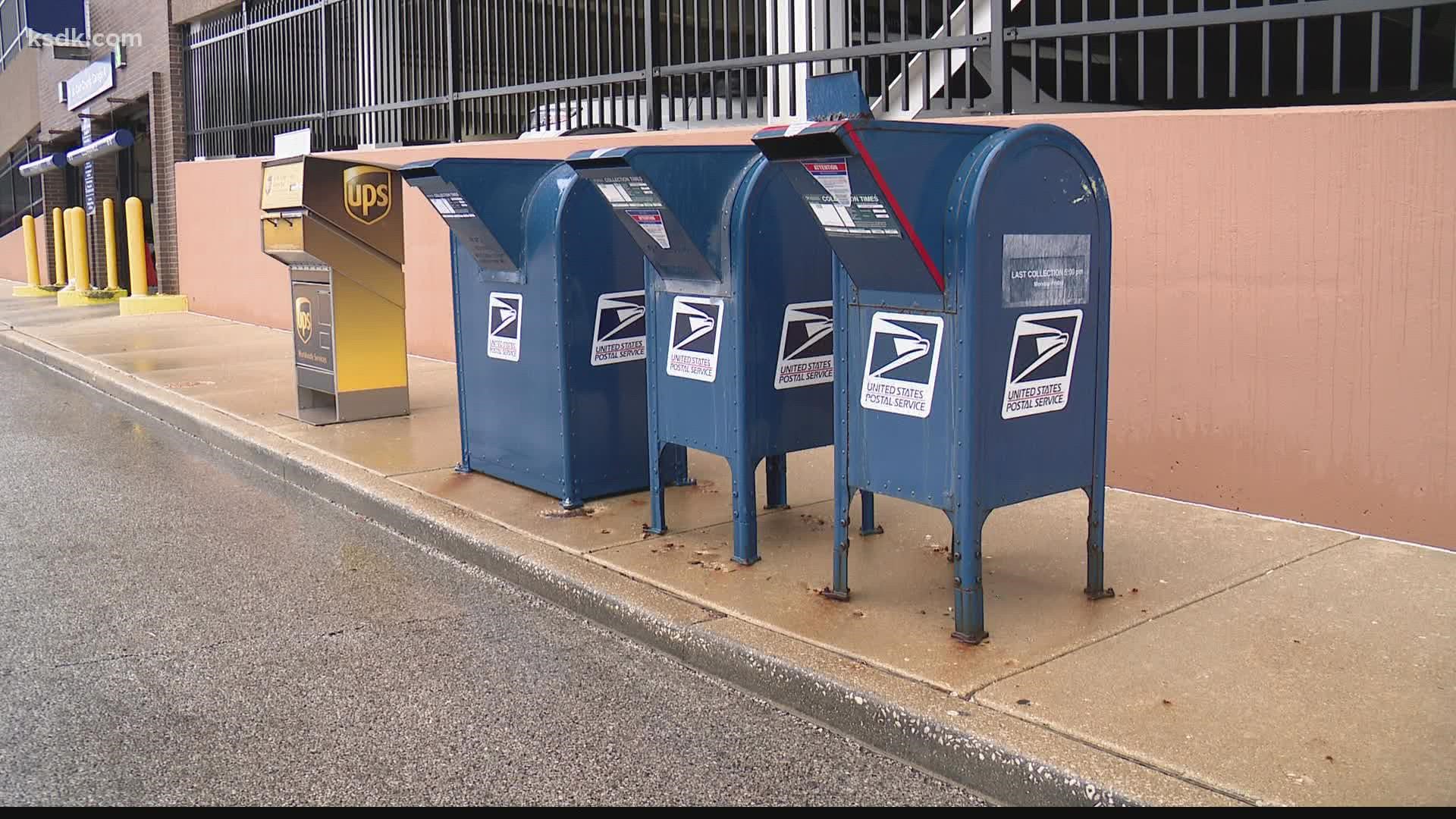ST. LOUIS — The next time you have something to mail, think twice before you put it in one of those blue collection boxes in the St. Louis area.
Law enforcement sources tell the I-Team mailboxes in the 631-- ZIP code prefix area, which includes parts of St. Louis and St. Louis County, have been hit hard by thieves who are using universal keys known as arrow keys to unlock mailboxes and take checks and other mail to steal identities.
At least two men have been federally indicted so far for a scheme that included using arrow keys to steal checks from mailboxes, change the amounts and payees, deposit them into third party accounts at multiple banks and cash them in before banks could realize they had been altered.
But the mail theft and stolen arrow key problem is still raging, and the United States Postal Service and the local postal inspector are being tight-lipped about it.
They’ve also known about it for years, and it’s coming at a time when the number of postal police officers is dwindling.
“Mail theft right now is out of control. That’s not an exaggeration. It’s absolutely out of control,” said Frank Albergo, president of the Postal Police Officer’s Association.
Just hours before the I-Team was scheduled to interview Brentwood police about multiple reports of mail theft there, the postal inspector asked the department not to talk about it because it is part of an “ongoing investigation.”
Police in Clayton issued a press release about the problem they’re having, but said the postal inspector’s office did not want them to comment beyond that.
The head of the Postal Police Officer’s union thinks he knows why.
“Because it makes them look bad, like they’re not doing their job,” said Albergo.
In the mid-2000s, about 1,000 postal police officers patrolled mail routes where theft was most prevalent. Now, there are only about 400 officers nationwide, Albergo said.
He likened postal police officers to the rank-and-file of any police department and said postal inspectors were like the detectives at a department.
“In the summer of 2020, the postal service, in their infinite wisdom, decided that we should no longer be doing that and now we're relegated to postal facilities,” he said. “So, postal police officers, during a mail theft epidemic, are sitting in postal facilities.
“It's hard to believe, but that's actually what's happening."
He likened it to a rise in homicides.
"And, in reaction, the St. Louis police department says, ‘You know, we're going to pull our uniform cops off the street,'" Albergo explained. "Imagine what would happen.”
The postal police union sued the postal service and lost. Albergo said the postal service doesn’t want its officers to be eligible for retirement benefits after 20 years of service.
Meanwhile, Albergo said the cutbacks in officers have left mail carriers and mailboxes vulnerable.
“Mail carriers are getting robbed at gunpoint for their arrow keys,” Albergo said. “The last thing a criminal is going to do is say, ‘Oh there's a postal police officer, I think I'll rob this carrier, and I think I'll steal this mail today.”
In 2019, there were 94 armed robberies of mail carriers reported.
As of Oct. 1, 2021, there were 165.
“(Arrow keys) open up all the collection boxes or the cluster boxes or the apartment panels or the relay boxes in a given ZIP code, so once you have that key, you have access to all of it,” he said. “And then what you do is, you wash the checks and you cash them. If you've washed so many that there are no more check cashing places left, now you sell them on the Internet.”
Associate Professor David Maimon of Georgia State University has been tracking the issue.
"Once they have the checks, they have the identity of the victim and they can continue using the identity for printing fake drivers licenses, passports and they have the bank account details,” Maimon said.
He said his team of researchers have found dozens of videos and pictures of gang members using stolen arrow keys.
In St. Louis, the thieves have been targeting mailboxes that tend to be clustered outside of postal offices after 9 p.m.
The two men who have been federally indicted, Cameron Childress and Derrick Hollins Jr., worked with other people who gave them account information at banks including Commerce Bank, First Community Credit Union, Neighbors Credit Union and U.S. Bank. They would then deposit the checks they stole into those accounts and cash them before the banks could catch on, according to court documents.
“The banks have been pretty good with reimbursing people, but the problem is, what if you need that money right away?” Albergo said. “What if you can't wait three months to be reimbursed by the bank? What if you live check-to-check? What if you have to pay your rent and the landlord wants that money right now?
"It's just it's a terrible situation and it's easily avoidable. They have a postal police force and they're not using it. It's a real shame, it's a shame,” he said.
Problems with arrow keys are nothing new to the postal service.
In 2020, the Office of the Inspector General released an audit, which found multiple faults in the way arrow keys are managed, including:
- The number of arrow keys in circulation is unknown
- Local post offices do not adequately report lost, stolen or broken keys or maintain inventories
- Postal Service policy does not establish a maximum number of arrow keys when ordering replacements
What the Postal Service has done to improve the situation is top secret.
A spokeswoman sent a statement to the I-Team, which read: “We are continuing to address this, but unable to provide details for security reasons.”
Postal Inspector John Jackman, who oversees the Chicago/St. Louis field office, said he could not comment on the arrow key or mail theft problem, because he didn’t want to jeopardize “an ongoing investigation.”
Meanwhile, people are continuing to have their mail stolen.
In Clayton, police there tell the I-Team they’ve had 33 reports of checks being stolen from mailboxes since the end of January.
The department directed all questions from the I-Team to the Postal Inspector.
“They can admit, ‘Oh, we're not doing our job,' or they could say, ‘No comment,’ so they've chosen the no comment route,” stated Albergo.
Albergo said the union understands postal inspectors are also overwhelmed, as the opioid epidemic rages on and people send drugs through the mail.
He said hope is on the horizon for postal police officers in the form House of Representatives Bill 5587. The bipartisan legislation would restore postal police authority.
“Call your congressman, say ‘Put PPOs back on the street, our mail is being stolen. Americans deserve better than having the mail stolen and the inspection service doing very little about it,’” Albergo said. “Is it going to completely stop it now? No, of course not, mail theft is a major problem, but it will help.”
In the meantime, the Postal Service is recommending people use mail slots that are inside of their facilities and avoid using blue drop boxes.
Albergo has an analogy for that, too.
“It's similar to McDonalds saying don't eat hamburgers,” he said. “But, here we are.”
The spokesman for the local Postal Inspector’s office also declined to be interviewed for this story, citing the “ongoing investigation.”
Despite investigations and federal indictments, a spokesperson with the postal inspector's office in St. Louis says with "volume attacks", thieves could be holding on to your already stolen checks, waiting for the right time to alter them and wipe out your bank account.
Federal investigators say it wouldn't be surprising for people to discover they've been a victim of mail theft and fraud.
"These investigations have legs, but we're going to run the marathon on this," said Matt Villicana, United States Postal Inspector.
Villicana says it's important for people to continue to report stolen mail by calling 1-877-876-2455 or www.uspis.gov.
He said members of the public can find all of the information they need to protect themselves online.
- Promptly pick up your mail, don’t leave letters and packages in your mailbox or at your door for any length of time.
- Deposit mail close to pickup time before the last collection or inside your local Post Office.
- Inquire about overdue mail. If you don’t receive a check, credit card or other valuable mail you’re expecting, contact the sender as soon as possible and inquire about it.
- Don’t send cash.
- Arrange for prompt pickup. If you cannot be home to receive a package, make another arrangement or use the USPS Hold Mail Service.
- Use Hold for Pickup. When shipping packages, use the Hold for Pickup option, and the recipients can collect the package at their local Post Office.


